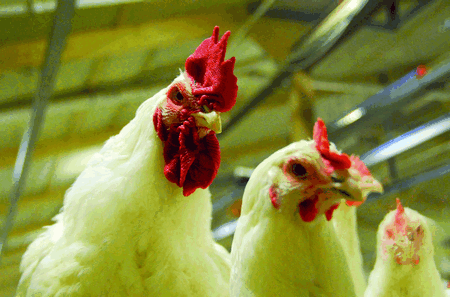Poultry research not relevant to producers

Recent years have seen a change in emphasis on research with DEFRA focusing more on animal welfare and the environment. On top of this, budgets have been slashed with only a fraction of the work carried out now compared with 10 years ago.
Speaking to delegates at the Spring Meeting of the WPSA, Aviagen global head of nutrition services Marcus Kenny kicked off by highlighting growing concerns in the industry over the divergence of government and industry research agendas. He highlighted a lack of communication or understanding between the industry, the various research bodies and public in terms of industry and public concerns.
“This has resulted in the public being left uninformed, leading to false perceptions of the industry.”
Research irrelevant
Meanwhile, the industry feels that current research is irrelevant in relation to the technical issues experienced in the field.
To address this, Mr Kenny believes the industry and research bodies should improve communication. And as part of this, he sees his paper at the meeting as a first step in this process by highlighting the technical issues.
“The first area is economically effective nutrition, as raw materials continue to be affected by the biofuels industry. In order to establish optimal economic feed strategies, response models for efficient nutrient use are required.”
He believes these response models will be needed to address concerns of mineral pollution and carbon and nitrogen losses from poultry systems. There is a conflict between maximising nitrogen losses and profit.
Another research priority is welfare concerns like pododermatitis, which is likely to be part of future EU legislation. There is a need to understand the background to this condition and its interaction with dietary factors, he said.

Heat stress as a result of higher seasonal temperatures and the failure to match environmental control systems to improved bird performance is an area that is likely to increase with climate change.
Disease resistance is also to become more important if treatments, such as coccidiostats, become unavailable in future. He highlighted that removal of antibiotic growth promoters in 2006 resulted in a greater reliance on therapeutic drugs to control enteric conditions, such as dysbacteriosis.
“Feeding strategies to optimise disease resistance are needed while the breeding industry requires the means of characterising intestinal micro flora to assist selection for enteric robustness.”
But for this to work, it requires funding and government backing is vital for research to progress. And it needs inclusive discussion between industries, funding bodies and researchers if industry relevant research is to be achieved.
Finally, there is a need to improve communication of the research itself. Without clear relevant and appropriate communication of research results to both industry and marketplace the benefits and findings from research are lost.
The paper was co-authored by Emma Fleming, also of Aviagen.
Research priorities
- Understanding the response of meat and egg stock to diet nutrient density
- Establishing most cost effective nutritional strategies
- Coping with increasing summer temperatures
- Disease resistance in light of possible in-feed medication withdrawal
- Pododermatitis as it may come under future EU legislation
- Balancing nutrient outputs with bird performance
